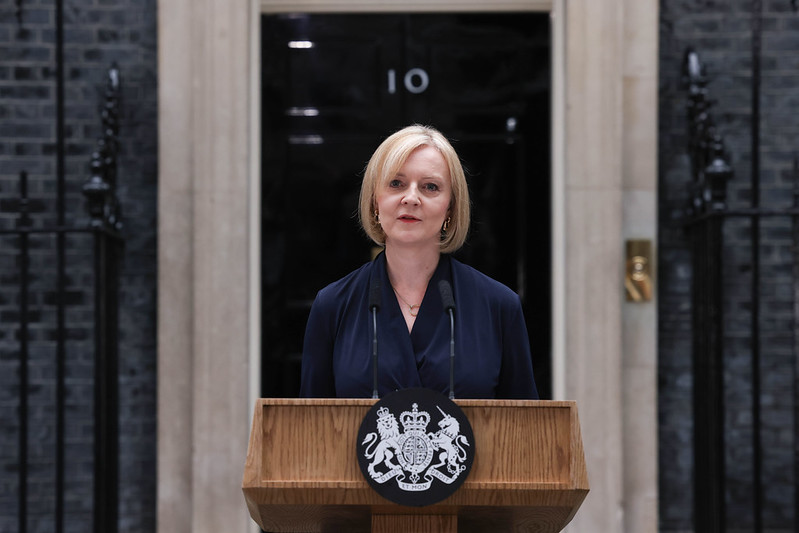The European search for an oil haven comes as an energy crisis plagues the globe, despite their incessant scrutiny of gas producing countries.
Energy was high on the agenda during a phone call exchanged between Qatar’s Amir Sheikh Tamim bin Hamad Al Thani and the United Kingdom Prime Minister Elizabeth Truss on Friday, as the new government in Downing Street attempts to navigate through an energy crisis.
The two leaders concurred that in these turbulent times, international cooperation is essential, the UK government’s official website reported. It comes as the British official provided a report on her visit to the European Political Community conference on Thursday, amid risks and gas shortages ahead of winter.
The prime minister praised close energy ties between Qatar and the UK, noting that London was making crucial steps to secure its long-term energy independence. By the year 2040, the UK hopes to become a net exporter of energy, she continued.
Both sides also hailed the expansion of trade and defence ties between Qatar and the UK, which further boosted their economies and security respectively.
Meanwhile, Sheikh Tamim praised Truss’ support in ensuring a successful FIFA World Cup tournament and expressed his excitement to welcome fans to the Gulf country, where the UK is set to provide security assistance.
The leaders then went on to agree to “stay in close touch,” the report detailed.
This comes as the UK official informed the new Truss-led government is eager to secure long-term gas deals with Qatar, Norway, and other nations across the world as the European country is at a risk of facing power blackouts as a result of gas shortages this winter.
Truss claimed that in order to reduce reliance on imports from authoritarian governments, ministers are eyeing multi-year agreements, according to reports.
“I have not signed any deal. But what I’m saying is that Britain’s energy security is vital and what we will be doing is always looking for value for money, of course we will, but it’s important that we have that long-term energy security,” Truss said.
Addressing Norwegian oil securement, she said: “First of all, we will move forward on our own energy security, so that’s more renewables here in the UK, it’s more nuclear power here in the UK, and it’s also moving forward faster with using North Sea facilities.
“But we are looking at long-term energy contracts with other countries because as well as making sure we’ve got a good price, energy security is vitally important,
“We never want to be in a position again where we’re dependent on authoritarian regimes for our energy. That’s why we’re in the situation we are now,” Truss added.
The comments come just after the UK’s energy regulator Ofgem issued a warning that the conflict in Ukraine and other supply problems in Europe pose a “significant risk” of gas shortages in Britain this winter.
“Due to the war in Ukraine and gas shortages in Europe, there is a significant risk that gas shortages could occur during the winter 2022-23 in Great Britain. As a result, there is a possibility that Great Britain could enter into a gas supply emergency,” said Ofgem, as quoted by the BBC.
Norway is the main supply of gas for Britain – in the second quarter of the year, it accounted for almost 52% of all the gas imported by the UK.
Qatar, which contributed less than 9% of imports, came in second.
In May, Qatar’s Energy Minister Saad Sherida Al Kaabi said western countries including the UK are facing the consequences for their aggressive drive to eliminate carbon emissions in a bid to combat climate change by “demonising oil and gas companies.”
In an interview with Sky News, Al Kaabi noted that his country is willing to help the UK with its cost of living crisis, however, the Western powers must take responsibility. Years of pushing for an urgent end to fossil fuel production and calling gas producers the “bad guys” had contributed to the current crisis, he asserted.
Al Kaabi noted that the recent surge in oil and energy prices in Europe and beyond is not entirely as a result of the Russian and Ukrainian crisis but rather could be traced back many years before the event.
“It’s definitely a deeper issue,” he said while addressing the steady decrease of investments in gas production over the past few years as Europe pushed a move towards achieving net-zero through renewable sources.
“There was a build up of countries pushing for the [energy] transition in a hard way. [They pushed for] net-zero, moving to renewables, doing away with fossil fuels and demonising the oil and gas companies, [calling them] the bad guys. And [as a result] you don’t have enough investment in the oil and gas sector,” Al Kaabi said, according to Sky News.
As Europe seeks to steer away from its dependence on Russian gas amid the invasion of Ukraine, EU countries are scrambling for a share in the world’s biggest liquified natural gas (LNG) project, Qatar’s North Field Expansion project.
Some of the European countries that have sought Qatari gas supplies include Germany, Italy, the UK and France.







